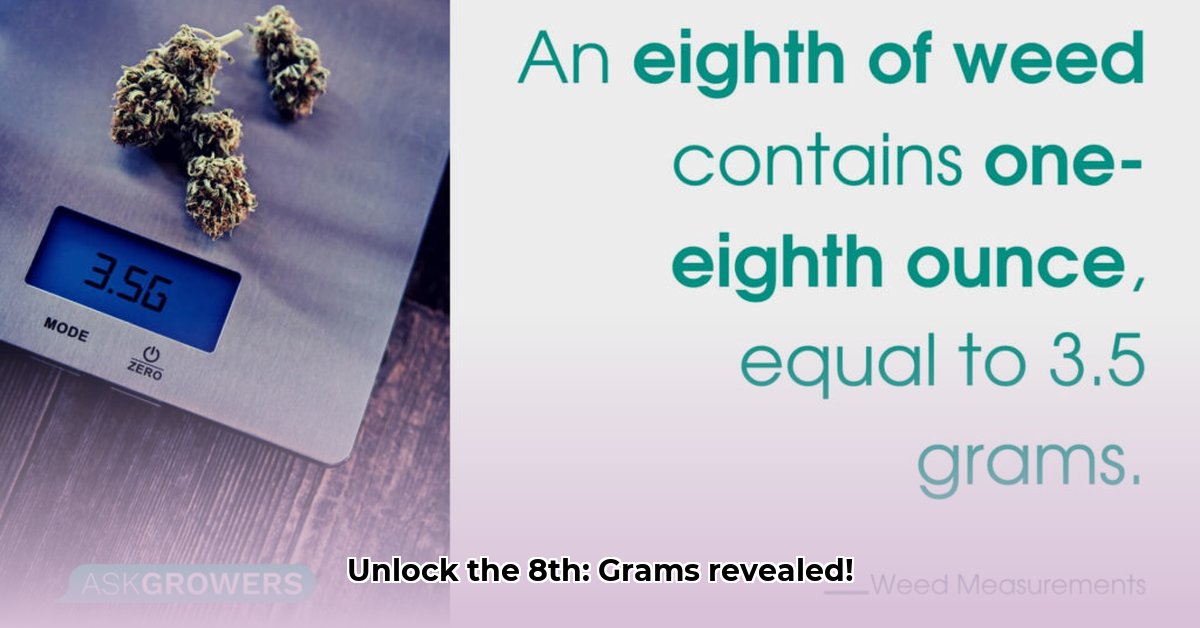# How Many Grams in an Eighth: The Ultimate Guide to Cannabis Weight
Ever wondered exactly how much weed you're getting when someone says "an eighth"? It sounds simple, but navigating cannabis measurements can be tricky. This guide breaks down the gram equivalent of an eighth of an ounce, potential weight fluctuations, price variations, local laws, and smart buying strategies. By the end, you'll be a confident and informed cannabis consumer. For a deeper dive into eighth conversions, check out this helpful guide: [Eighth Conversion Guide](https://turthledeep.com/how-many-grams-are-in-an-eighth-of-an-ounce/).
## Deciphering Cannabis Measurements
Understanding cannabis measurements clarifies quantities and helps you compare prices effectively.
### What Exactly is an "Eighth" of Cannabis?
An "eighth" signifies one-eighth of an ounce. Since an ounce contains approximately 28 grams, an eighth equals roughly 3.5 grams. This standardized measurement simplifies price comparisons across different cannabis strains and dispensaries. Think of it like buying a pint of ice cream – you expect a certain volume, even if the density varies slightly.
### Factors Influencing Cannabis Weight Variations
While 3.5 grams represents the standard, the actual weight of an eighth can vary due to natural differences in cannabis buds.
* **Bud Density:** Dense buds, though appearing smaller, pack more weight. Fluffier buds might look larger but still weigh 3.5 grams.
* **Moisture Content:** Excessive moisture can increase weight, while overly dry buds might weigh less.
* **Stem Content:** Larger stems contribute to the overall weight but don't offer the desired effects.
### Key Considerations: Price, Legality, and Cannabis Quality
The price of an eighth of cannabis varies significantly based on several key factors:
* **Location:** Prices reflect local demand, taxes, and regulations. Dispensaries in high-demand areas or states with higher taxes generally charge more.
* **Strain Quality:** Premium strains cultivated by reputable growers command higher prices due to their potency, flavor profiles, and rarity.
* **Local Regulations:** Legality significantly impacts pricing. In areas where cannabis is legal and readily available, prices tend to be more competitive.
Always verify the weight at the point of purchase to ensure you receive the correct amount. Comparing prices from multiple sources helps you find the best deals. Stay informed about local laws before purchasing or possessing cannabis to avoid legal issues.
### Smart Cannabis Shopping: Maximizing Value
Navigate the cannabis market wisely with these actionable tips:
1. **Verify the Weight:** Always confirm the weight with a calibrated scale before completing your purchase.
2. **Compare Prices and Quantities:** Evaluate prices from multiple vendors, considering the total amount received relative to the price. Look for discounts on larger quantities if you're a frequent consumer.
3. **Assess Bud Density:** Recognize that bud size doesn't always correlate with weight. Ask your budtender to explain the density characteristics of different strains.
4. **Inquire About Strain Information:** Don't hesitate to ask about the strain's genetics, origin, terpene profile, and potential effects.
5. **Check for Deals and Promotions:** Many dispensaries offer daily or weekly deals, loyalty programs, and discounts for veterans or medical patients.
## Accurately Calculating the Weight of Cannabis
Understanding potential weight discrepancies is crucial for fair transactions and consistent dosing.
### Potential Discrepancies in Cannabis Measurements
Several factors can contribute to discrepancies in the weight of an eighth of cannabis:
* **Vendor Practices:** Different scales, calibration methods, and rounding practices can lead to slight variations.
* **Bud Density:** Variations in bud density between different strains can affect the perceived amount.
* **Scale Accuracy:** The precision and calibration of weighing scales impact accuracy. Home scales may not be as accurate as those used in dispensaries.
### Practical Guide: Weighing Cannabis Accurately
For precise weight measurement, use a digital scale with a resolution of at least 0.1 grams. Follow these steps:
1. **Calibrate Your Scale:** Ensure your scale is properly calibrated before each use, following the manufacturer's instructions.
2. **Prepare Your Container:** Place a clean, dry container on the scale and press the "tare" button to zero out the weight of the container.
3. **Weigh Your Cannabis:** Carefully add the cannabis to the container until you reach the desired weight.
4. **Record Your Findings:** Note the exact weight displayed on the scale.
### Understanding THC and CBD Dosage
While this article focuses on weight, understanding THC and CBD content is equally important, especially for medicinal users. Look for lab-tested products with clear cannabinoid profiles.
* **THC (Tetrahydrocannabinol):** The primary psychoactive compound in cannabis.
* **CBD (Cannabidiol):** A non-psychoactive compound known for its potential therapeutic benefits.
### Legal and Market Considerations
Always purchase cannabis from licensed and regulated dispensaries to ensure product legitimacy and accurate labeling. These dispensaries are required to adhere to strict standards for product quality, safety, and accurate measurement.
## Expert Buying Tips: Avoiding Common Mistakes
Savvy cannabis purchasing involves understanding weights, measures, and market dynamics.
### Common Cannabis Weights
Remember these key conversions:
* **Gram:** A single gram, often used for trying new strains.
* **Eighth:** Approximately 3.5 grams, a common purchase quantity.
* **Quarter:** Approximately 7 grams, suitable for regular users.
* **Half Ounce:** Approximately 14 grams, a cost-effective option for frequent consumers.
* **Ounce:** Approximately 28 grams, typically the most economical option for heavy users (where legal).
### Price Per Gram and Availability
The price per gram varies significantly based on quality, strain, location, and dispensary. Bulk purchases typically offer a lower price per gram, but always calculate the actual cost per gram to ensure you're getting a good deal.
### Avoiding Slang Confusion
Avoid using slang terms like "dime bag" or "dub," as these terms lack standardized meanings and can lead to confusion. Instead, stick to standard weight measurements (grams, eighths, quarters, etc.).
### Expert Purchasing Advice
* **Use a Scale:** Always verify the weight with a calibrated digital scale.
* **Compare Prices:** Compare prices from multiple dispensaries, calculating the price per gram for different quantities and strains.
* **Ask Questions:** Don't hesitate to ask your budtender about the strain's genetics, growing conditions, THC/CBD content, and potential effects.
* **Check for Lab Testing:** Look for products that have been independently lab-tested for potency and purity.
* **Know Your Limits:** Be aware of local possession limits and consume cannabis responsibly.
## Smart Cannabis Purchases
Informed cannabis purchasing involves research, comparison, and a clear understanding of your needs.
### Key Cannabis Weight Measurements
Familiarize yourself with these standard measurements:
* **Eighth (1/8 ounce):** 3.5 grams
* **Quarter (1/4 ounce):** 7 grams
* **Half-ounce (1/2 ounce):** 14 grams
* **Ounce (oz):** 28 grams
### Factors Affecting Weight and Price
Variations in bud density, moisture content, and stem content can affect weight. Pricing fluctuates based on strain, cultivation methods (indoor vs. outdoor), location, dispensary, and market demand.
### Actionable Tips for Informed Cannabis Purchases
1. **Research Strains:** Learn about different strains, terpene profiles, and their potential effects. Use online resources like Leafly or Allbud.
2. **Compare Prices:** Calculate the price per gram for different quantities and strains at various dispensaries.
3. **Check Lab Results:** Reputable dispensaries provide lab test results, which include information on cannabinoid content (THC, CBD), terpene profile, and potential contaminants (pesticides, heavy metals).
4. **Read Reviews:** Check online reviews for dispensaries and specific products to get insights from other consumers.
5. **Ask Questions:** Don't hesitate to ask your budtender questions about product details, recommended dosages, and potential effects.
Latest posts by Turthledeep (see all)
- How to Stop Apps From Running in the Background to Boost Your - December 1, 2025
- How To Move Apps On Your Droid For Better Organization - November 30, 2025
- How to Move Apps on Android for Better Organization - November 29, 2025










